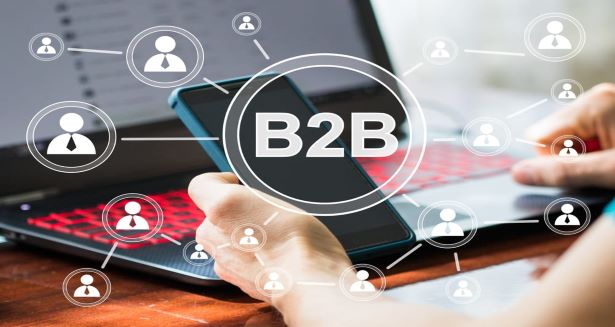E-Business
Five Reasons why E-commerce is a Boost to Informal Retail

Having existed in the background for centuries, Nigeria’s informal retail market is witnessing massive rejuvenation, thanks to B2B e-commerce brands applying technology to resolve the chronic market problems.

In the last three years, new market routes have emerged for retailers, as the industry gradually embraces the digital revolution. Discussed in this article are five ways e-commerce will further boost the informal retail market.
Price stability: Fast moving consumer goods are the everyday necessities that make informal retail thick, but those familiar with the market would know that prices of these goods are constantly unstable. One major improvement e-commerce brands bring to this market is to help regulate price of products.
“With our services, we have not only eliminated the need to allocate revenue to transport fares and market fees, we have also regulated the prices of products. Thereby, we ensure that our informal retailers are not affected by unreasonable price-hikes.
As evidence of this, 96% of our retailers say that our prices are fair and competitive compared to other suppliers,” said market expert and CEO of Alerzo Limited, Adewale Opaleye.
Open market options: The current market structure has lasted for ages, but retailers who are the major link to consumers still mostly end up with the short end of the stick.
A chat with these retailers will show that current market arrangement leaves them at the mercy of distributors: unpredictable prices and scarcity of products, especially during peak demand periods, are few of the many prevalent issues.
Majority of them would gladly embrace another market route to rival the current distributor/marketer chain. Interestingly for retailers, e-commerce brands not only offering cheaper restocking routes, but also an efficient option which will lead to a competitive and ultimately a more vibrant market.
Improved distribution chain: The activities of e-commerce players in the industry will not only benefit the retailers, but the whole distribution value chain. Since their entry into the market, the B2Bs have reiterated that they are here as market aggregators, who see the current league of wholesalers/distributors as partners, and have no aim of displacing them.
Also, facilities of these B2B e-commerce platforms can be of benefit to distributors. A platform like Alerzo said it provides warehousing and fulfilment solutions to suppliers.
The company said it currently owns over 200 vehicles and 20 warehouses to serve thousands of retailers on its platform. Some B2B players have also said current suppliers and distributors serve as a source of product supply for them in certain regions of the country.
Market insight for manufacturers: By their business model, B2B e-commerce brands penetrare hitherto marginalised and underserved retailers mostly in rural settlements. This ability to penetrate rural communities make them good data banks, as they are able to gather information from their first hand interaction with retailers.
Such data will come in handy for manufacturers, by providing them insights into present customer behaviour and ultimately help proper planning and development of suitable products.
Better business experience for retailers: Customer relationships and retention for informal retailers are major metrics of success while running their stores.
By offering an easy and convenient inventory channel, e-commerce will help retailers deliver better customer services. By ordering inventory online, a retailer saves time and energy, thus having more time for customer interaction.
Added to this is improved access to funds for business growth. About 85% of informal retailers settle transactions in cash, not out of choice but because the credit system financially marginalises them.
Informal retailers who embrace these digital platforms also have the opportunity of building transaction records on e-payment apps that will facilitate access to loans. Some e-commerce platforms like Alerzo also provide sellers with training and advisory that helps improve their digital skills and open them to more opportunities to grow their businesses.
E-Business
Galaxy Backbone Celebrates the Federal Government’s Paperless Civil Service Milestone

Galaxy Backbone (GBB) aligns with and celebrates the successful announcement by the Office of the Head of the Civil Service of the Federation on the achievement of a Paperless Civil Service, a significant milestone in Nigeria’s public sector reform and digital transformation agenda.

The milestone was formally highlighted at a press briefing led by the Head of the Civil Service of the Federation, Mrs. Didi Esther Walson-Jack, who commended Galaxy Backbone for its sustained support and contribution throughout the implementation of the programme.
GBB has played a critical role in enabling this transition by providing secure, scalable, and shared digital infrastructure that supports the digitisation of government processes across Ministries, Departments and Agencies (MDAs). Through the 1Government Cloud, MDAs have been empowered to migrate from paper-based workflows to digital platforms, improving efficiency, collaboration, data security, and service delivery across the Federal Civil Service.
In addition, GovMail, GBB’s secure government email platform, has strengthened official communication, enhanced records management, and reinforced cybersecurity standards—key pillars in sustaining a paperless operating environment.
Galaxy Backbone acknowledges the collective efforts of the Office of the Head of the Civil Service of the Federation, Permanent Secretaries, Directors of ICT, consultants, partners, and dedicated public servants whose commitment and collaboration ensured the smooth delivery of this initiative.
The Managing Director/Chief Executive Officer of Galaxy Backbone, Prof. Ibrahim Adeyanju, was represented at the press briefing by Akintayo Bamisaye, Acting Group Head, Research, Digital Innovation and Skills Department (RDIS).
GBB describes the achievement as a strong close to 2025 and reaffirms its commitment to supporting the Federal Government in building a modern, efficient, and digitally enabled public service.
E-Business
Jumia CEO says Black Friday Signals Nigeria’s E-Commerce Maturity

At the close of 2025, Temidayo Ojo, the CEO of Jumia Nigeria, reflected on a year-end shopping season that points to the growing maturity of the country’s e-commerce market. “Black Friday is no longer a single, short-lived spike in activity,” he said.

“It has become a familiar, anticipated moment in the retail calendar, where consumers shop deliberately and with confidence.”
Preliminary KPIs for the two months ended November 30, 2025, show strong year-on-year growth in both orders and Gross Merchandise Value (GMV), with GMV growth outpacing order growth. This indicates that customers are placing fuller, more considered baskets rather than shopping in fragmented transactions. Nigeria ranked among Jumia Group’s better-performing markets, with engagement remaining steady throughout the Black Friday period rather than spiking briefly and tapering off.
A key factor behind this performance is the growing familiarity of consumers with online shopping. Customers are increasingly leveraging platform features such as saved carts, brand stores, and price comparison tools to plan purchases in advance. This trend suggests that digital commerce is becoming embedded in everyday habits rather than being viewed as a one-off event.
Ojo also highlighted the role of Jumia’s JForce network in connecting digital commerce to local communities. “Our agents are critical to ensuring that customers across Nigeria, including secondary cities and smaller communities, have access to variety, consistent pricing, and reliable delivery,” he said. “During peak periods like Black Friday, JForce agents can respond faster, serve more customers efficiently, and build stronger local relationships. This isn’t just a distribution channel—it’s a pathway to sustainable income and inclusion.”
Reflecting on the overall performance, the CEO concluded: “What we’re seeing this year-end is steady engagement across categories, stronger consumer confidence, and partners like our JForce agents benefiting from increased activity.
“It confirms that Nigeria’s e-commerce ecosystem is maturing, growing in a more structured and resilient way. As the December Holiday Sale continues, we expect these patterns of familiarity, trust, and participation to sustain momentum and drive both commerce and community impact across the country.”
E-Business
Galaxy Backbone Tops FG’s Website Performance Ranking

Galaxy Backbone Limited (GBB) has been ranked first overall in the 2025 Federal Government Website Performance Scorecard.

This is a landmark achievement for Nigeria’s digital economy.
The ranking, conducted by the Bureau of Public Service Reforms (BPSR), is the definitive benchmark for digital excellence and transparency across all Ministries, Departments, and Agencies (MDAs).
Professor Ibrahim Adepoju Adeyanju, managing director and CEO of Galaxy Backbone, received the award during a ceremony in Abuja.
He described the feat as a validation of the agency’s“Nigeria First”data sovereignty strategy and its relentless pursuit of service excellence.
This recognition comes as the Federal Government intensifies its push to achieve a fully paperless civil service by December 31, 2025.
GBB has been the primary architect of this transition through its 1Gov Enterprise Content Management (ECM) platform, which now hosts the operations of almost all federal MDAs.
The award adds to a growing list of accolades for Galaxy Backbone in 2025, following its recent win of the “International Standard Excellence Award for Best IT Service Provider.”
As the central hub for government shared services, GBB’s performance serves as a blueprint for other agencies currently undergoing digital transformation.
With its expanded fiber-optic backbone now covering over 13 states and its secure cloud solutions, Galaxy Backbone remains the cornerstone of Nigeria’s vision to become a leading digital nation by the end of the decade.

 Telecom2 days ago
Telecom2 days agoT2 Faces NCC Probe in Benue Over Major Service Outage in 9 LGAs

 Telecom2 days ago
Telecom2 days agoMTN Nigeria Crowns Ayo Benzi Winner of Next Afrobeats Star

 E-Business2 days ago
E-Business2 days agoJumia CEO says Black Friday Signals Nigeria’s E-Commerce Maturity

 E-Financial2 days ago
E-Financial2 days agoGTCO Secures Regulatory Approvals to Raise N10bn in Private Placement

 General News2 days ago
General News2 days agoNDIC Reinforces Full Oversight Compliance to Safeguard Depositors

 E-Financial1 day ago
E-Financial1 day agoBanks to Impose N50 Stamp Duty on Transfers of N10,000 and Above from January 1

 Telecom2 days ago
Telecom2 days agoNCC Unveils Draft 5-Year Spectrum Roadmap, 60 GHz License-Exempt Guidelines to Boost Broadband, Innovation

 Telecom2 days ago
Telecom2 days agoNCC Grants 45 Days for Telecoms Firms to Fix Unapproved Shareholding Changes

























